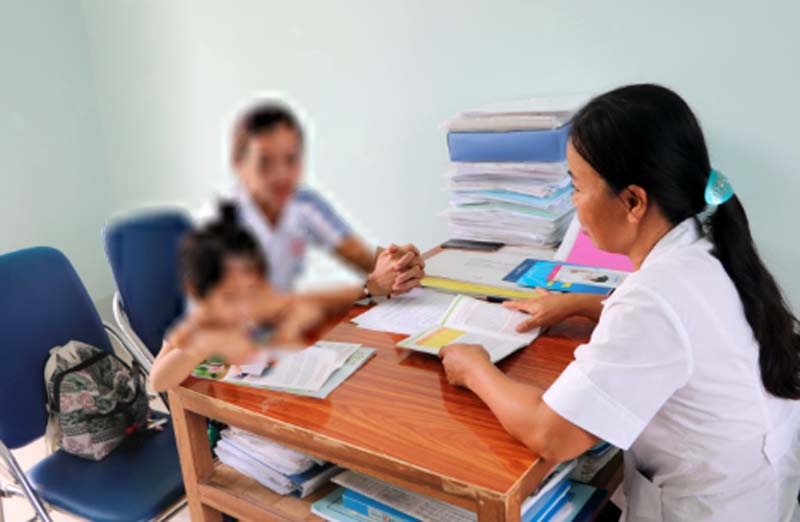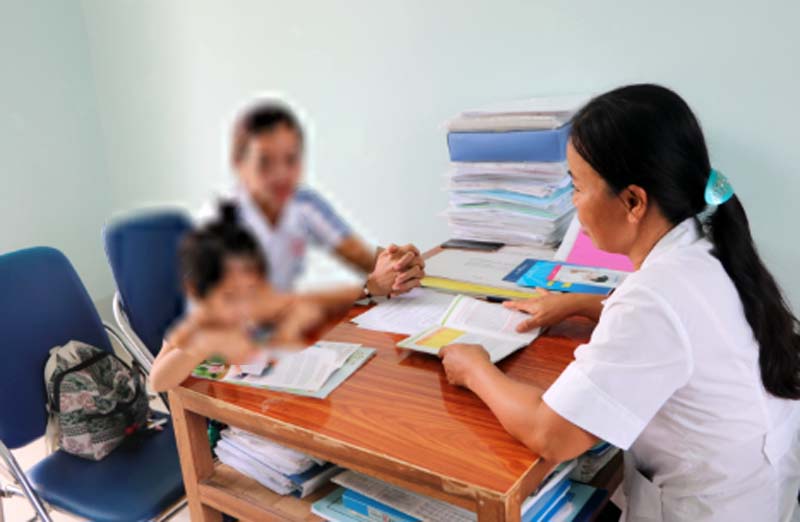
(HBO) - According to relevant agencies, total monthly drug cost for an HIV patient according to treatment guidance No1 comes to about 200,000 VND, and 1.6 million VND according to treatment guidance No2. When HIV patients contract other diseases, they HIV patients are also granted drugs treating opportunistic infections worth about 2 million VND a month, not to mention costs of diagnosis, ultrasonic scan and tests.
 Health worker at the
clinic in Mai Ha commune (Mai Chau district) gives consultation to an HIV
patient.
Health worker at the
clinic in Mai Ha commune (Mai Chau district) gives consultation to an HIV
patient.
With the support from
the provincial People’s Committee, 321 HIV patients in the province were
granted free health insurance cards in 2017. The number was 460 in 2018, and as
of June 30, 2019, a total of 888 HIV patients had been granted the cards. Among
them, 543 patients are receiving treatment at the out-patient section of the
provincial general hospital, 34 children at the pediatric section, 156 at the
Lac Son district clinic, 90 at the Mai Chau district clinic, 40 at the Kim Boi
district clinic and 25 at the Luong Son district clinic.
It is noteworthy that
the health insurance premiums for those HIV patients are based on the current
base wage, specifically 1,390,000 VND in 2018, and 1,490,000 VND as from July 1
this year.
More and more HIV
patients are receiving free health insurance, which is an important move of
great significance. The insurance has eased the burden for HIV patients, as
most of them are poor and live in remote areas with poor transport
infrastructure. Besides the health insurance, the patients can now receive
diagnosis and treatment at the locality where they live. This is one of the
effective measures to help reduce the patients’ complex about their disease, as
well as discrimination against them.
Through the free health
insurance, the HIV patients feel they are cared about by the authorities, and
have desire to live better. This proves the benefit of the policy. /.
The emulation movement "Hoa Binh joining hands to build new-style rural areas” has been widely spreading, becoming a driving force that motivates the localities to renew rural landscapes and improve the material and spiritual lives of the residents. In this movement, the people play a central role-both as the main implementers and direct beneficiaries of its outcomes.
In response to the global digital revolution, Hoa Binh Newspaper is transforming itself into a modern and multi-platform media hub, blending cutting-edge technology with a restructured newsroom and a new generation of tech-savvy journalists.
Hoa Binh province’s Association of the Elderly recently held a conference to review the project on expanding the inter-generation self-help club model until 2025.
In a move to implement Resolution No. 57-NQ/TW, issued on December 22, 2024 by the Politburo, which targets breakthroughs in science-technology development, innovation, and digital transformation, the Hoa Binh provincial Department of Health has issued a plan to roll out the "Digital Literacy for All” campaign within the local health sector.
An Nghia Commune (Lạc Sơn District) is one of the communes that achieved the tha standard of the national new rural area in 2018. Entering a new development phase, the commune is now trying to meet the criteria for the advanced new rural development. With the strong political will and the public consensus, the commune is gradually overcoming the challenges to reach this goal, aiming for the sustainable development.



 Health worker at the
clinic in Mai Ha commune (Mai Chau district) gives consultation to an HIV
patient.
Health worker at the
clinic in Mai Ha commune (Mai Chau district) gives consultation to an HIV
patient.